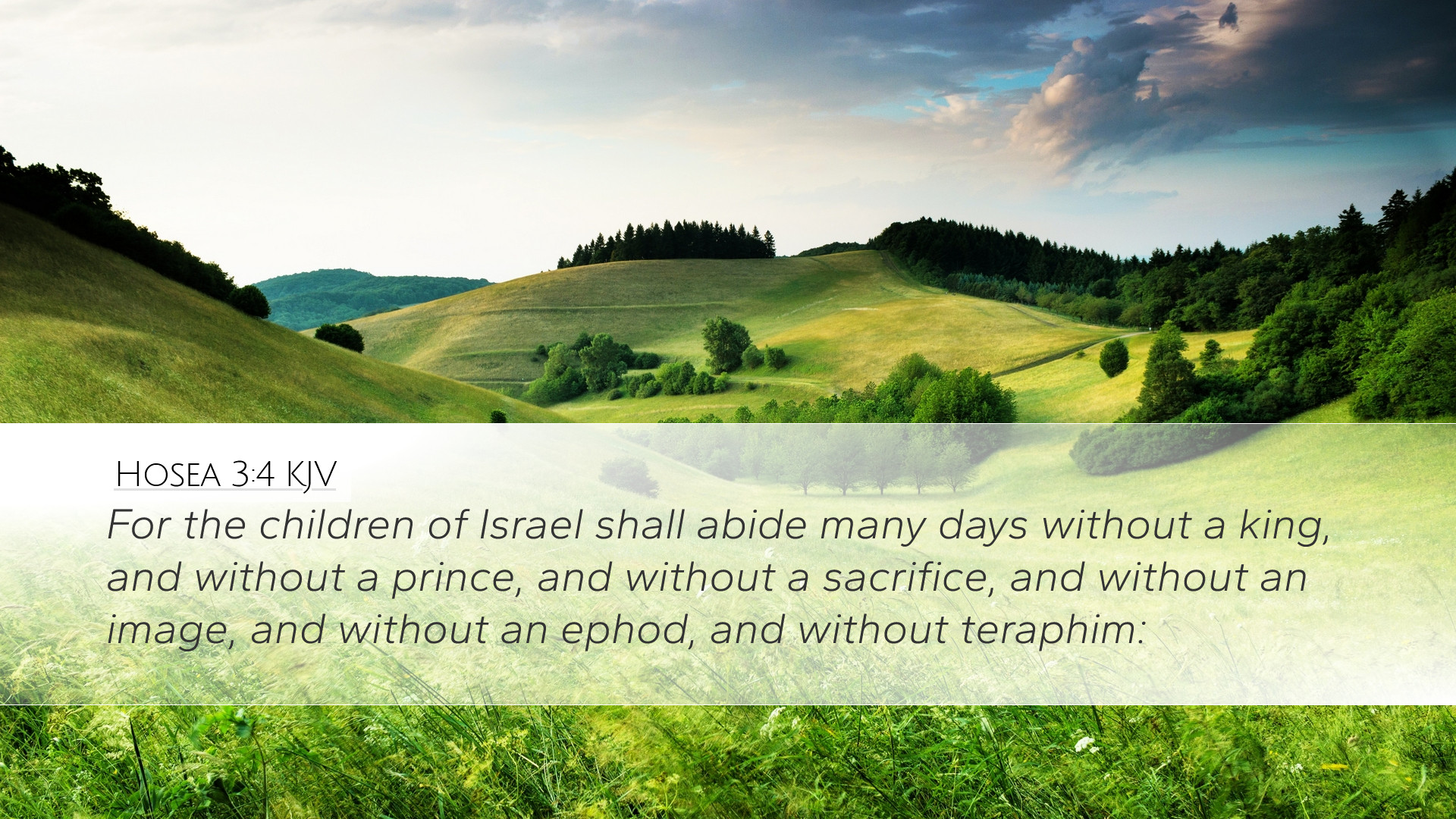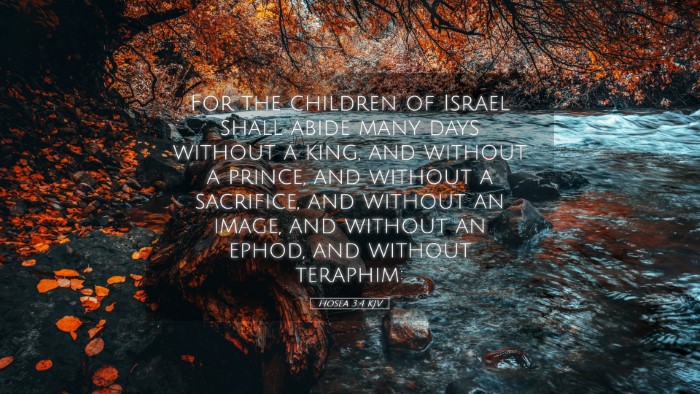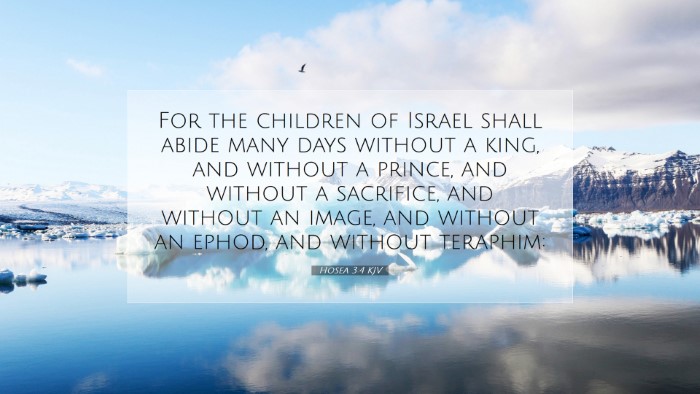Old Testament
Genesis Exodus Leviticus Numbers Deuteronomy Joshua Judges Ruth 1 Samuel 2 Samuel 1 Kings 2 Kings 1 Chronicles 2 Chronicles Ezra Nehemiah Esther Job Psalms Proverbs Ecclesiastes Song of Solomon Isaiah Jeremiah Lamentations Ezekiel Daniel Hosea Joel Amos Obadiah Jonah Micah Nahum Habakkuk Zephaniah Haggai Zechariah MalachiHosea 3:4
Hosea 3:4 KJV
For the children of Israel shall abide many days without a king, and without a prince, and without a sacrifice, and without an image, and without an ephod, and without teraphim:
Hosea 3:4 Bible Commentary
Commentary on Hosea 3:4
Verse: "For the children of Israel shall abide many days without a king, and without a prince, and without a sacrifice, and without an image, and without an ephod, and without teraphim." (Hosea 3:4)
Context Overview
This verse is situated within a prophecy that conveys the profound judgment and consequences upon Israel due to unfaithfulness to God. The prophetic message of Hosea is steeped in the themes of love, redemption, and the eventual restoration of God's covenant people.
Commentary Insights
-
Matthew Henry's Perspective:
Henry expounds on the state of Israel during the prophetic declaration, emphasizing the absence of civil leadership and spiritual ordinances. He notes that this desolation reflects their separation from God and the resulting chaos in their national and religious life. The lack of a king signifies not only a political vacuum but also the spiritual void where divine order should prevail.
Henry asserts that the Israelites' longing for reinstatement, both kingship and priesthood, will eventually bring them back to God. Their experience of waiting in this desolation serves as a period of reflection and preparation for repentance and restoration.
-
Albert Barnes' Insights:
Barnes elucidates the phrase "shall abide many days" as a prophetic reference to a prolonged period of disunity and isolation. He connects this with Israel's historical trajectory, where the kingdom had fallen, the worship had distorted, and idolatry had become rampant.
His commentary points out that the absence of sacrifice indicates a significant disruption in their relationship with God, as the sacrificial system was fundamental to their covenant identity. Barnes highlights that such a void prompts reflection on the nature of true worship, which is not merely ritualistic but intrinsic to the allegiance to Yahweh.
-
Adam Clarke's Analysis:
Clarke approaches the symbolic meanings of the terms used in Hosea 3:4, providing insights into the cultural significance of kingship and priesthood in ancient Israel. He elaborates on the ephod as a priestly garment associated with divination and seeking God's will, suggesting that without it, there is a clear loss of divine guidance among the people.
Moreover, Clarke addresses the implications of the lack of teraphim, referencing household gods that can represent both the continuation of idol-worship and the fragmented spiritual heritage of Israel. He argues that the mention of such idols juxtaposes the true God and highlights the futility of seeking security in that which is not holy.
Theological Themes
The verse encapsulates several theological themes relevant to today's readers and scholars:
- Judgment and Mercy: The absence of leadership and sacrificial worship illustrates God's judgment on the covenant community for their unfaithfulness. Yet, it also sets the stage for a future restoration, where discipline leads to spiritual awakening.
- The Importance of True Worship: The void of sacrifices and the mention of teraphim call attention to the necessity of authentic worship practices that align with God's commands, challenging modern readers to evaluate their own forms of worship.
- Hope in Restoration: While this passage highlights a bleak period, it also implicitly points to the hope of redemption and the eventual return to God’s favor, foreshadowing the coming Messiah who would restore Israel's fortunes.
Practical Applications
For pastors and leaders, Hosea 3:4 serves as a reminder of the consequences of straying from God's paths. The importance of maintaining a vibrant relationship with God is paramount. Here are some practical applications:
- Evaluate Spiritual Leadership: Churches today must ensure that their leadership is grounded in God’s Word and guided by the Spirit. This chapter challenges us to assess the spiritual health of our congregations.
- Encourage Authentic Worship: Worship should flow from a heart wholly devoted to God, rather than just rituals or traditions. Pastors can emphasize the significance of personal devotion and community worship practices that reflect true obedience and reverence for God.
- Communicate Hope: Even amid desolation, there is hope. Teach congregants that God's discipline is not for punishment alone but also for restoring us to Himself. Emphasizing grace can uplift those who feel lost or distant from God.
Conclusion
Hosea 3:4 serves as a poignant reminder of the consequences of disobedience and the longing for restoration that ultimately leads one back to God. The reflections drawn from classical commentators like Matthew Henry, Albert Barnes, and Adam Clarke foster a deeper understanding of this scripture, enriching our approach to ministry and personal faith. Through its examination, we are called to engage in self-reflection, promote authentic worship, and instill hope amid our struggles.


